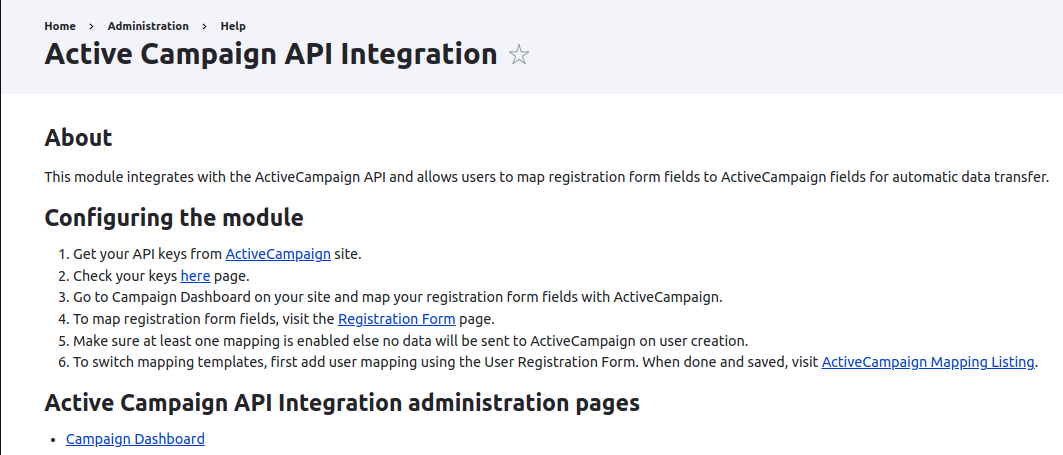
hook_help() is a core Drupal hook that enables modules to define help topics for various aspects of their functionality. This encompasses providing module overview help, detailed help for specific pages, and contextual help for configuration forms. By implementing hook_help(), module developers can ensure that users have easy access to relevant documentation, improving their understanding and overall experience with the module.
Benefits of Implementing hook_help
Incorporating hook_help() into your Drupal module offers several benefits:
- Enhanced User Experience: Users can easily access module documentation without leaving the Drupal interface, streamlining their understanding of the module's features and usage.
- Improved Module Discoverability: Comprehensive help topics make your module more user-friendly, increasing its adoption and visibility within the Drupal community.
- Reduced Support Burden: By providing clear and concise documentation, you can minimize user support requests related to your module's functionality.
- Streamlined Module Maintenance: Well-documented code becomes easier to understand and maintain, both for yourself and other developers.
Implementing hook_help: A Step-by-Step Guide
- Create a Help Topic Structure: Determine the scope of your help topics, considering both module overview and specific page documentation.
- Define Help Topic Arrays: For each help topic, create an associative array containing relevant information, such as the topic title, description, and links to additional resources.
- Implement hook_help(): In your module's .module file, define the hook_help() function. This function receives two parameters: $route_name and $route_match.
- Conditionally Render Help Topics: Use the $route_name and $route_match parameters to determine which help topics to render based on the current page or user interaction.
- Provide Contextual Help: For configuration forms, use the $form object to provide contextual help for specific form elements.
- Test and Refine: Thoroughly test your help topics to ensure accuracy, clarity, and consistency.
Let's add the hook_help to a module :-
Consider a module called "Active Campaign API integration" that integrates with the ActiveCampaign API and allows users to map registration form fields to ActiveCampaign fields for automatic data transfer.To provide help for this module, we can implement hook_help() as follows:
- Navigate to the file where your Drupal hooks is defined. In this example, it is in the active_campaign_api_integration.module file.
- Now we determine the scope of module help topics, considering both module overview and its README.md file to add the following hook_help() function to provide documentation for the module:
use Drupal\Core\Form\FormStateInterface;
use Drupal\Core\Routing\RouteMatchInterface;
/**
* Implements hook_help().
*/
function active_campaign_api_integration_help($route_name, RouteMatchInterface $route_match) {
switch ($route_name) {
case 'help.page.active_campaign_api_integration':
$output = '<h3>' . t('About') . '</h3>';
$output .= '<p>' . t('This module integrates with the ActiveCampaign API and allows users to map registration form fields to ActiveCampaign fields for automatic data transfer.') . '</p>';
$output .= '<h3>' . t('Configuring the module') . '</h3>';
$output .= '<ol>';
$output .= '<li>' . t('Get your API keys from <a href="https://www.activecampaign.com" target="_blank">ActiveCampaign</a> site.') . '</li>';
$output .= '<li>' . t('Check your keys <a href=":active-campaign-keys"><u>here</u></a> page.', [':active-campaign-keys' => Url::fromRoute('active_campaign_api_integration.keys')->toString()]) . '</li>';
$output .= '<li>' . t('Go to Campaign Dashboard on your site and map your registration form fields with ActiveCampaign.') . '</li>';
$output .= '<li>' . t('To map registration form fields, visit the <a href=":registration-form-link"><u>Registration Form</u></a> page.', [':registration-form-link' => Url::fromRoute('active_campaign_api_integration.form_registration_set_up')->toString()]) . '</li>';
$output .= '<li>' . t('Make sure at least one mapping is enabled else no data will be sent to ActiveCampaign on user creation.') . '</li>';
$output .= '<li>' . t('To switch mapping templates, first add user mapping using the User Registration Form. When done and saved, visit <a href=":mapping-listing-link"><u>ActiveCampaign Mapping Listing</u></a>.', [
':mapping-listing-link' => Url::fromRoute('active_campaign_api_integration.map_user_list')->toString(),
]) . '</li>';
$output .= '</ol>';
return $output;
}
}Code Explanation-
Use Statements:
The use statements at the beginning of the code bring in necessary classes/interfaces for the function, such as FormStateInterface and RouteMatchInterface. These are essential for handling form states and route matches in Drupal.
Switch Statement:
The function checks if the current route is 'help.page.active_campaign_api_integration'. If it is, the function proceeds to generate help content specific to the Active Campaign API Integration module.
HTML Output:
The generated help content is HTML markup. It includes headers (<h3>) for section titles and paragraphs (<p>) for module descriptions. The content provides an overview of the module and detailed steps for configuring it.
Link Generation:
The code uses the Url::fromRoute() method to generate URLs for links. This ensures that links are generated correctly based on the Drupal routing system.
Return Statement:
The function returns the generated HTML content, which will be displayed on the Help page when the user visits the specified route.- After adding the hook_help() function, you need to clear the Drupal cache for the changes to take effect. You can do this by navigating to Configuration -> Performance and clicking on the "Clear all caches" button.
Visit your Drupal site and navigate to the Help page (Extend -> Active Campaign API integration). You should see a Help icon under your module,

and when you click on it, the information you provided in hook_help() should be displayed.

Now your hook_help() is implemented effectively, It will be very helpful for your Drupal module users with the knowledge they need to fully utilize its features and enhance their overall Drupal experience.
Add new comment